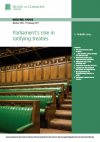Scrutiny and transparency in UK trade policy-making

Democracy and transparency in trade matters to us all
There are two facts that everyone should know about the UK’s trade policy as we prepare to leave the EU. The first is that modern trade agreements have a huge impact – for good and for bad – on many areas of life including jobs, the environment, health, development, food and inequality.
The second is that under current rules, the UK government has unchecked powers to negotiate and sign trade agreements.
The government has the power to: decide who to start negotiations with; set its own priorities and objectives for these negotiations; conduct negotiations, often in secret; and conclude and sign the eventual deal.
There are no procedures in place to ensure trade negotiations are accountable to Parliament or the public. Incredibly, MPs have no powers to scrutinise ongoing negotiations and provide direction. The public has no right of input or to know what is being done. Parliament is eventually asked to ratify the agreed final deal, but in practice the procedure is a nominal one and MPs are not even guaranteed a vote on whether to approve or reject trade deals.
The UK has not been responsible for trade policy for 40 years, so it is understandable that our procedure for negotiating and ratifying trade agreements needs some reform. Yet, to date, the government has not taken steps to update this procedure.
In November 2017, the government introduced a Trade Bill to enable its independent trade policy after Brexit. This is a key piece of legislation and provided a clear opportunity for the government to demonstrate its commitment to transparency and democracy in trade policy. However, at present the Bill lacks any provision to make trade policy accountable to Parliament.
What is TJM calling for?
Urgent reform to the UK’s trade scrutiny processes is needed. The UK’s trade scrutiny processes should be overhauled to make sure they are open, inclusive and transparent. TJM feels that following issues need to be urgently addressed:
1. The UK’s trade policy is not underpinned by a comprehensive trade strategy. A plan that sets out how trade should interact with key policy areas such as its climate ambitions, human rights, and standards should be published. This would provide a framework against which UK trade policy could be judged.
2. The UK’s trade negotiations are opaque and undemocratic. Parliament, the devolved nations, civil society and the public should have the opportunity to debate and meaningfully input into both proposed negotiating objectives and trade negotiations as they progress. New trade agreements should be developed under principles of transparency and inclusivity.
3. We are denied a final say on new trade agreements. Parliament and the devolved nations should be empowered to scrutinise and amend, and approve or reject, trade agreements, as well as preserve the right to review and withdraw from trade agreements in a timely manner.
4. The implementation of trade agreements must be thoroughly monitored. Detailed information on the impact of new trade agreements on all regions and sectors should be shared so that the public
understand the effects of trade policy, including the economic, social and environmental implications here and abroad.
Reports and Briefings
UK trade policy - why good scrutiny matters
The UK’s trade scrutiny processes should be overhauled to make sure they are open, inclusive and transparent.
A Trade Model That Works for Everyone
A joint business, union and NGO framework to ensure the UK’s trade policy is more inclusive, transparent and democratic and benefits all sta...
TJM submission to the International Trade Committee inquiry into UK Trade Policy Transparency and Scrutiny
Trade Justice Movement submission outlining the provisions required in a transparent and democratic procedure for developing trade agreement...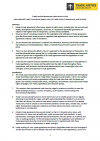
The Trade Bill: Constitutional Implications and Recommendations
This briefing identifies the constitutional implications of the Trade Bill and makes recommendations for amendments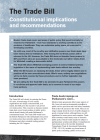
Submission to the House of Commons Public Bill Committee on the Trade Bill
A submission calling for the Trade Bill to be amended to include essential transparency and scrutiny provisions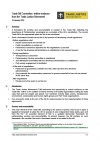
Fairtrade Foundation Briefing – Trade & Customs Bills, 2nd Reading
Fairtrade Foundation Briefing on the Trade and Customs Bills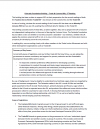
Why MPs must act now or risk threat to parliamentary sovereignty
Global Justice Now parliamentary briefing on the Trade Bill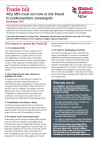
Briefing for MPs for second reading of the Trade Bill, 9 January 2018
Greener UK briefing on the Trade Bill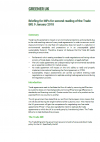
Briefing on International Development issues for the Trade Bill 2nd reading
Traidcraft briefing on International Development issues for the Trade Bill 2nd reading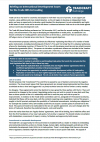
Briefing on International Development issues for the customs bill 2nd reading
Traidcraft Briefing on the Taxation (Cross-border trade) Bill, also known as the Customs Bill.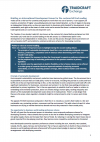
Feedback from the Trade Justice Movement on the white paper "Preparing for our future UK trade policy"
Response from TJM to the UK government's proposals on trade policy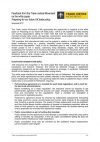
No more secret trade deals: the urgent need for transparency and democracy in UK trade deals
War on Want briefing on the urgent need for trade democracy in the UK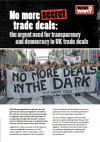
Giving away control? How Brexit will make UK trade deals less democratic and what to do about it
Global Justice Now briefing on trade democracy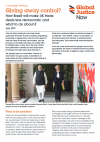
Back to Basics: Trade Agreements
Class briefing on the impacts of trade agreements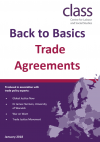
Democratising UK Trade Post-Brexit
Democracy and transparency in UK trade policy matter to us all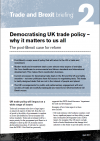
Parliament's role in ratifying treaties
A House of Commons briefing outlining the limited influence that Parliament has in composing and ratifying treaties